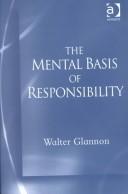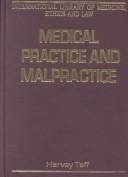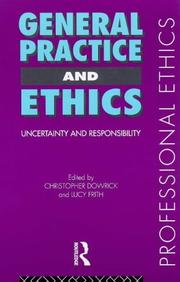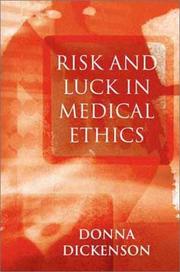| Listing 1 - 10 of 12 | << page >> |
Sort by
|

ISBN: 0754604624 9780754604624 Year: 2002 Publisher: Aldershot Ashgate
Abstract | Keywords | Export | Availability | Bookmark
 Loading...
Loading...Choose an application
- Reference Manager
- EndNote
- RefWorks (Direct export to RefWorks)
This book is an analysis of the ways in which mental states ground attributions of responsibility to persons. Particular features of the book include: attention to the agent's epistemic capacity for beliefs about the foreseeable consequences of actions and omissions; attention to the essential role of emotions in prudential and moral reasoning; a conception of personal identity that can justify holding persons responsible at later times for actions performed at earlier times; an emphasis on neurobiology as the science that should inform our thinking about free will and responsibility; and the melding of literature on free will and responsibility in contemporary analytic philosophy with legal cases, abnormal psychology, neurology and psychiatry, which offers a richer texture to the general debate on the relevant issues.
verantwoordelijkheid (verantwoordingsplicht, verantwoording) --- responsabilité (imputabilité, obligation de rendre compte) --- Responsibility --- Cognition --- Accountability --- Moral responsibility --- Obligation --- Ethics --- Supererogation --- Psychology
Book
ISBN: 2225853290 Year: 1998 Publisher: Paris Milan Barcelone Masson
Abstract | Keywords | Export | Availability | Bookmark
 Loading...
Loading...Choose an application
- Reference Manager
- EndNote
- RefWorks (Direct export to RefWorks)
Gezondheidsrecht --- Gerechtelijke geneeskunde --- medisch ongeval (therapeutisch ongeval) --- aansprakelijkheid (schadevergoeding, burgerlijke aansprakelijkheid, beroepsaansprakelijkheid) --- verantwoordelijkheid (verantwoordingsplicht, verantwoording) --- verzekeringsgeneeskunde --- Droit sanitaire --- Médecine légale --- accident médical (accidents médicaux, accident thérapeutique) --- responsabilité (indemnisation, responsabilité civile, responsabilité professionnelle) --- responsabilité (imputabilité, obligation de rendre compte) --- médecine des assurances --- Medical laws and legislation --- France --- Law --- Criminal liability --- Evidence (Law) --- Evidence [Expert ]
Book
ISBN: 287374023X 2762117216 9782873740238 9782762117219 Year: 1994 Volume: *31 Publisher: Louvain-La-Neuve Montréal Artel Editions Fides
Abstract | Keywords | Export | Availability | Bookmark
 Loading...
Loading...Choose an application
- Reference Manager
- EndNote
- RefWorks (Direct export to RefWorks)
Professional ethics. Deontology --- Bioethics --- Medical ethics --- Bioéthique --- Ethique médicale --- Responsabilité --- --Philosophie morale --- --Bioéthique --- --bio-ethiek (medische, biomedische ethiek, bio-ethische aspecten) --- verantwoordelijkheid (verantwoordingsplicht, verantwoording) --- bioéthique (éthique médicale, biomédicale, aspects bioéthiques) --- responsabilité (imputabilité, obligation de rendre compte) --- bio-ethiek (medische, biomedische ethiek, bio-ethische aspecten) --- Biology --- Biologie --- Éthique médicale --- Social aspects --- Aspect social --- --Bioethics --- Bioéthique --- Ethique médicale --- --Professional ethics. Deontology --- Philosophie morale --- Biology - Social aspects --- Biologie - Aspect social
Book
ISBN: 2711131629 9782711131624 Year: 2000 Publisher: Paris Litec
Abstract | Keywords | Export | Availability | Bookmark
 Loading...
Loading...Choose an application
- Reference Manager
- EndNote
- RefWorks (Direct export to RefWorks)
Medical law --- Tort and negligence --- France --- artsen (geneesheren) --- arts-patiëntrelatie --- aansprakelijkheid (schadevergoeding, burgerlijke aansprakelijkheid, beroepsaansprakelijkheid) --- verantwoordelijkheid (verantwoordingsplicht, verantwoording) --- gezondheidsinformatie (patiënteninformatie) --- patiëntenrechten (rechten van de patiënt) --- 13.12 --- médecins --- relation médecin-patient --- responsabilité (indemnisation, responsabilité civile, responsabilité professionnelle) --- responsabilité (imputabilité, obligation de rendre compte) --- informations médicales (informations relatives au patient) --- health information (patient information) --- droits du patient (droits des malades) --- Wettelijke en contractuele aansprakelijkheid ; Geneesheren ; Veeartsen ; Apothekers ; Tandartsen ; Paramedici --- RESPONSABILITE --- MEDECIN

ISBN: 0878409068 Year: 2003 Publisher: Washington Georgetown University Press
Abstract | Keywords | Export | Availability | Bookmark
 Loading...
Loading...Choose an application
- Reference Manager
- EndNote
- RefWorks (Direct export to RefWorks)
Modern psychological and political theory meet head-on in this powerful re-evaluation of America's contradictory and sometimes dangerous addiction to individualism. Best-selling author Gaylin and co-author Jennings investigate the contentious intersections of interdependence and autonomy, rights and public responsibility. They examine the painful abrasion occurring between America's tradition of personal freedom and privacy, as it rubs against the still valuable if almost vanishing ideals of sacrifice and social order. Our current culture of autonomy - championed by both liberals on the left and libertarians on the right - is based on the idea of rationality as the motivation for human conduct. But, as the authors remind us, people are not simply rational creatures - appeals to emotions are always far more effective than logical argument in changing our behavior. This timely edition includes a new preface; updated examples and illustrations throughout; and, new coverage of contemporary social critics and their work since the publication of the first edition. Two essential new chapters, one on the movement to forgo life-sustaining treatment and the other on physician-assisted suicide, particularly clarify the authors' arguments. Drawing on these and numerous other illustrations - with significant emphasis on the state of American health care - Gaylin and Jennings demonstrate that society has not just the right but the duty to occasionally invoke fear, shame, and guilt in order to motivate humane behavior. As cases of AIDS are once again on the upswing, as the dangerously mentally ill are allowed to wander free and untreated, as starvation and poverty still hold too many in its grip in the richest nation on the planet, this controversial book, considerably revised and expanded, is needed more than ever. If we are to indeed preserve and nurture a genuinely free - and liberal - society, the authors suggest that these "coercions" may be essential for the health and the maturity of a nation where we all too often avert our eyes, not seeing that our neighbor is in pain or trouble and needs our help.
Social ethics --- Political philosophy. Social philosophy --- United States --- Civil society --- Individualism --- Involuntary treatment --- Libertarianism --- autonomie --- autonomie van de patiënt --- verantwoordelijkheid (verantwoordingsplicht, verantwoording) --- paternalisme (anti-paternalisme) --- gedwongen behandeling (dwangbehandeling) --- sociale uitsluiting --- maatschappelijke evolutie (sociale verandering) --- sociologie (sociologische aspecten) --- socio-economische aspecten (socio-economische factoren) --- filosofie (filosofische aspecten) --- ethiek (ethische aspecten) --- autonomie du patient --- responsabilité (imputabilité, obligation de rendre compte) --- traitement forcé --- exclusion sociale --- évolution sociale (changement social) --- sociologie (aspects sociologiques) --- aspects socio-économiques (facteurs socio-économiques) --- philosophie (aspects philosophiques) --- ethique (aspects ethiques) --- Coerced treatment --- Coercive care --- Coercive treatment --- Compulsory treatment --- Enforced treatment --- Forced treatment --- Treatment, Involuntary --- Patients --- Therapeutics --- Informed consent (Medical law) --- Legal status, laws, etc. --- United States of America

ISBN: 0754620336 9780754620334 Year: 2001 Publisher: Aldershot Ashgate
Abstract | Keywords | Export | Availability | Bookmark
 Loading...
Loading...Choose an application
- Reference Manager
- EndNote
- RefWorks (Direct export to RefWorks)
Our familiarity of the term "medical malpractice", which is commonplace in North American jurisdictions, and increasingly used elsewhere, cannot disguise an element of imprecision. Frequently equated with negligence, "malpractice" has also been held to cover trespassory conduct, as well as to embrace professional misconduct more generally. Although the essential focus of this volume is on medical negligence, it incorporates some material, for example, on confidentiality and fiduciary relationships, which reflects a broader conception of the field. In selecting the articles which make up the work, the author concentrated on providing an overview of medical practice and malpractice which highlights the ways in which the issues and developments have been addressed in a variety of jurisdictions.
Physicians --- Medical care --- Medicine --- Malpractice --- Practice --- medisch recht (biomedisch recht) --- medisch ongeval (therapeutisch ongeval) --- aansprakelijkheid (schadevergoeding, burgerlijke aansprakelijkheid, beroepsaansprakelijkheid) --- verantwoordelijkheid (verantwoordingsplicht, verantwoording) --- arts-patiëntrelatie --- droit médical (droit biomédical) --- accident médical (accidents médicaux, accident thérapeutique) --- responsabilité (indemnisation, responsabilité civile, responsabilité professionnelle) --- responsabilité (imputabilité, obligation de rendre compte) --- relation médecin-patient --- Medical malpractice --- Medical negligence --- Tort liability of physicians --- Medical laws and legislation --- Defensive medicine --- Health Workforce --- Delivery of health care --- Delivery of medical care --- Health care --- Health care delivery --- Health services --- Healthcare --- Medical and health care industry --- Medical services --- Personal health services --- Public health --- Physicians - Malpractice --- Medicine - Practice
Book
ISBN: 2704010366 9782704010363 Year: 1999 Publisher: Vélizy Doin
Abstract | Keywords | Export | Availability | Bookmark
 Loading...
Loading...Choose an application
- Reference Manager
- EndNote
- RefWorks (Direct export to RefWorks)
L'information et la relation sont parties intégrantes du soin dans la mesure où elles fondent et animent un rapport interindividuel. En lui-même, le soin révèle de cette notion de communication dont l'étymologie latine exprime la relation avec, le partage, la mise en commun. La personne souhaite être respectée et reconnue dans son autonomie de décision. Que signifie une information loyale, claire et appropriée ? A quel type d'obligations, les professionnels de la médecine se trouvent désormais confrontés ? A l'émergence de quels droits assistons-nous ? Comment les reconnaître et les intégrer dans des pratiques médicales souvent complexes ? De quelle manière parvenir au consentement libre et éclairé ? La notion d'information peut-être comprise comme un effort de cohérence, de mise en forme et donc comme la condition même du dialogue. N'est-elle pas dès lors située au cœur de la relation de soin ? Partant de situations concrètes, ce colloque s'est proposé d'établir un diagnostic critique de réalités qui pour être diverses, nous invitent à mieux penser et assumer les responsabilités relevant des pratiques médicales et soignantes.
arts-patiëntrelatie --- patiëntenrechten (rechten van de patiënt) --- verantwoordelijkheid (verantwoordingsplicht, verantwoording) --- gezondheidsinformatie (patiënteninformatie) --- medische deontologie (medische deontologische code, medische plichtenleer, eed van Hippocrates, medische code) --- medische fout (therapeutisch ongeval, medische aansprakelijkheid, foutloze aansprakelijkheid) --- aansprakelijkheid (schadevergoeding, burgerlijke aansprakelijkheid, beroepsaansprakelijkheid) --- Frankrijk --- relation médecin-patient --- droits du patient (droits des malades) --- responsabilité (imputabilité, obligation de rendre compte) --- informations médicales (informations relatives au patient) --- health information (patient information) --- code de déontologie médicale (serment d'Hippocrate, déontologie médicale, code médical) --- faute médicale (responsabilité médicale, responsabilité sans faute) --- responsabilité (indemnisation, responsabilité civile, responsabilité professionnelle) --- France --- Conferences - Meetings

ISBN: 0415164990 0415164982 Year: 1999 Publisher: London Routledge
Abstract | Keywords | Export | Availability | Bookmark
 Loading...
Loading...Choose an application
- Reference Manager
- EndNote
- RefWorks (Direct export to RefWorks)
How much ethical teaching did you get as a medical student? What about as a registrar. How about in the last 5 years? Is it time for a refresher or perhaps even an introduction? The title General Practice and Ethics: Uncertainty and Responsibility certainly sounds relevant. Do the contents live up to expectations? This is not an introductory book, but it provides insights and questions that are relevant to all who are involved in family practice. The book is an edited series of chapters written by those involved in academic general practice in the UK. It is, however, relevant to those working in other health care systems. The first part of the book is devoted to themes. A series of chapters exploring uncertainty and responsibilities, evidence-based medicine, ethico-legal dilemmas, confidentiality and patient-centredness provide a different approach from the classic texts on biomedical ethics. This method works in that, although very concise, the authors outline several different models for dealing with dilemmas. The ‘themes' section finishes with a discussion of ethics and post-modernity. This for me was the chapter I had to re-read to get a grasp of it (to be honest I am still not sure I have yet understood all the concepts.) The second half of the book deals with several specific topics: prescribing, depression, advance directives and, finally, research. For most of us, the first three are important, the first two being very common—and both these chapters produced new insights into these common problems. The chapter on advance directives is a useful reader on a topic that promises to be an ethical maze when one is faced with a real case. The chapter about research may not be relevant to everyone, but is certain to be of increasing importance. Summing up then, this book is good value, well written and relevant to experienced practitioners. It can be dipped into or read cover to cover. Of note are the contemporary nature of the topics and the relevance of the whole volume to the practising family doctor. It makes a useful contribution to the literature.
Evidence-based medicine --- Medical ethics. --- Physicians (General practice) --- Primary care (Medicine) --- Moral and ethical aspects. --- Professional ethics. --- huisartsen --- medische praktijk --- verantwoordelijkheid (verantwoordingsplicht, verantwoording) --- onzekerheid --- beroepsethiek (ethische beroepscodes) --- ethiek (ethische aspecten) --- médecins généralistes --- pratique médicale --- responsabilité (imputabilité, obligation de rendre compte) --- insécurité --- éthique professionnelle (code d'éthique) --- ethique (aspects ethiques) --- Medical ethics --- Primary medical care --- Medical care --- General practice (Medicine) --- General practitioners --- Medicine --- Family medicine --- Biomedical ethics --- Clinical ethics --- Ethics, Medical --- Health care ethics --- Bioethics --- Professional ethics --- Nursing ethics --- Social medicine --- EBM (Medicine) --- Evidence-based healthcare --- Clinical medicine --- Systematic reviews (Medical research) --- Moral and ethical aspects --- Practice --- Specialties and specialists --- Decision making

ISBN: 0745621465 0745621457 Year: 2003 Publisher: Cambridge Polity Press
Abstract | Keywords | Export | Availability | Bookmark
 Loading...
Loading...Choose an application
- Reference Manager
- EndNote
- RefWorks (Direct export to RefWorks)
Ethics is commonly assumed to be the one realm in which luck and risk do not intrude. It has been said that 'While one can be lucky in one's business, in one's married life, and in one's health, one cannot, so it is commonly assumed, be subject to luck as far as one's moral worth is concerned.' But although we do not normally hold people responsible for outcomes beyond their control, a serious examination of the role of luck and risk may lead us to conclude that very few outcomes are really within people's control. This is the paradox of 'moral luck'. Risk and Luck in Medical Ethics examines the 'moral luck' paradox in greater detail, relating it to Kantian, consequentialist, and virtue-based approaches to ethics. Dickenson applies the paradoxes of risk and luck to medical ethics, including timely discussion of risk and luck in the allocation of scarce health care resources, informed consent to treatment, decisions about withholding life-sustaining treatment, psychiatry, reproductive ethics, genetic testing, and medical research and evidence-based medicine. The book concludes with an examination of the relevance of risk and luck in a medical context to the study of global ethics. If risk and luck are taken seriously, it would seem to follow that we cannot develop any definite moral standards at all, that we are doomed to moral relativism. However, Dickenson offers strong counter-arguments to this view that enable us to think in terms of universal standards for judging ethical systems. This claim has direct practical relevance for practitioners as well as philosophers.
Fortune. --- Medical ethics. --- Risk. --- Uncertainty. --- moraalfilosofie --- bio-ethiek (medische, biomedische ethiek, bio-ethische aspecten) --- risicomanagement (risico-evaluatie, risicobeheer) --- veiligheid --- geluk (onzekerheid) --- aansprakelijkheid --- verantwoordelijkheid (verantwoordingsplicht, verantwoording) --- ethiek (ethische aspecten) --- philosophie morale --- bioéthique (éthique médicale, biomédicale, aspects bioéthiques) --- évaluation du risque (gestion du risque) --- sécurité (principe de sécurité) --- chance (incertitude) --- responsabilité --- responsabilité (imputabilité, obligation de rendre compte) --- ethique (aspects ethiques) --- Fortune --- Medical ethics --- Risk --- Uncertainty --- Reasoning --- Economics --- Probabilities --- Profit --- Risk-return relationships --- Biomedical ethics --- Clinical ethics --- Ethics, Medical --- Health care ethics --- Medical care --- Medicine --- Bioethics --- Professional ethics --- Nursing ethics --- Social medicine --- Luck --- Opportunity --- Moral and ethical aspects
Book
ISBN: 9780262017978 9780262525978 0262017970 Year: 2012 Publisher: Cambridge (USA) The MIT Press
Abstract | Keywords | Export | Availability | Bookmark
 Loading...
Loading...Choose an application
- Reference Manager
- EndNote
- RefWorks (Direct export to RefWorks)
Human dignity has been enshrined in international agreements and national constitutions as a fundamental human right. The World Medical Association calls on physicians to respect human dignity and to discharge their duties with dignity. And yet human dignity is a term - like love, hope, and justice - that is intuitively grasped but never clearly defined. Some ethicists and bioethicists dismiss it; other thinkers point to its use in the service of particular ideologies. In this book, Michael Barilan offers an urgently needed, nonideological, and thorough conceptual clarification of human dignity and human rights, relating these ideas to current issues in ethics, law, and bioethics. Combining social history, history of ideas, moral theology, applied ethics, and political theory, Barilan tells the story of human dignity as a background moral ethos to human rights. After setting the problem in its scholarly context, he offers a hermeneutics of the formative texts on Imago Dei; provides a philosophical explication of the value of human dignity and of vulnerability; presents a comprehensive theory of human rights from a natural, humanist perspective; explores issues of moral status; and examines the value of responsibility as a link between virtue ethics and human dignity and rights. the author accompanies his theoretical claim with numerous practical illustrations, linking his theory to such issues in bioethics as end-of-life care, cloning, abortion, torture, treatment of the mentally incapacitated, the right to health care, the human organ market, disability and notions of difference, and privacy, highlighting many relevant legal aspects in constitutional and humanitarian lawBron: The MIT-press
Human rights --- Professional ethics. Deontology --- global bioethics --- mensbeeld --- menselijke natuur --- menswaardigheid (waardigheid) --- mensenrechten (rechten van de mens) --- verantwoordelijkheid (verantwoordingsplicht, verantwoording) --- moraalfilosofie --- moraalpsychologie --- geschiedenis (historische aspecten) --- image de l'homme --- nature humaine --- dignité humaine --- droits de l'homme --- responsabilité (imputabilité, obligation de rendre compte) --- philosophie morale --- psychologie morale --- histoire (aspects historiques) --- Ethiek --- Rechten van de mens --- Bio-ethiek --- Gezondheidszorg --- Respect for persons. --- Bioethics. --- Medical ethics. --- Human rights. --- Bioethics --- Medical ethics --- Respect for persons --- Conduct of life --- Persons --- Biomedical ethics --- Clinical ethics --- Ethics, Medical --- Health care ethics --- Medical care --- Medicine --- Professional ethics --- Nursing ethics --- Social medicine --- Basic rights --- Civil rights (International law) --- Rights, Human --- Rights of man --- Human security --- Transitional justice --- Truth commissions --- Biology --- Life sciences --- Life sciences ethics --- Science --- Moral and ethical aspects --- Law and legislation --- Mensenrechten --- Godsdienst --- Sport --- Duurzaamheid --- Filosofie --- Psychologie --- Sociologie --- Man --- Cultuur --- Erfelijkheidsleer --- Stadssamenleving --- Technologie --- Voeding --- Maatschappij --- Verpleegkunde --- Drank --- Gezondheid --- Volwassene
| Listing 1 - 10 of 12 | << page >> |
Sort by
|

 Search
Search Feedback
Feedback About
About Help
Help News
News